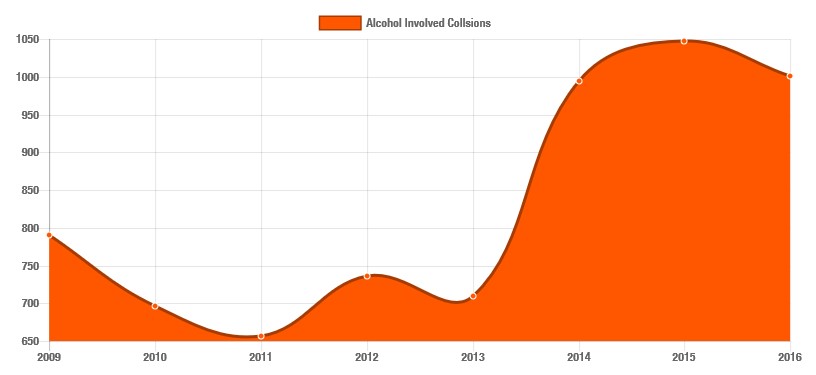San Diego Drunk Driving Accident Attorney
- 550+ Google 5-Star Reviews
- $1 Billion won over 15 years
- Won’t settle for low offers, not afraid to fight for max value
Get a Free Case Evaluation
No fees until we win!
All San Diego Case Types

Personal Injury

Brain Injury

Car Accident

Slip & Fall

Truck Accident

Wrongful Death
San Diego Drunk Driving Accident Attorney
Despite the city’s saturation patrols, county-wide checkpoints, and drunk driving education campaigns, San Diego continues to rank first in California for rates of drivers driving under the influence (DUI) — definitely not something for which you want to top the rankings.
Whether you’re traveling as a commuter, a tourist, or simply communing with nature, you’ll enjoy exploring California’s 50,000 miles of highways. You will encounter stunning views, exciting cities, and beautiful landscapes at every turn. As with any highway system, you’ll also sometimes share the road with careless or distracted drivers. The stakes are highest at night. because that’s when most drunk driving accidents occur.
While some drunk drivers cause simple fender benders, others initiate full-blown catastrophes. When a person decides to drink and drive, they endanger others with their diminished judgment. Their actions often cause serious damage and catastrophic injuries. If you were seriously injured by a drunk driver in San Diego, or a family member was seriously injured or killed, you understand the horrific price other people pay for a drunk driver’s mistakes. Call the San Diego drunk driving accident lawyers at Gomez Trial Attorneys for legal advice.
Drunk Drivers Must Pay for Their Actions
At Gomez Trial Attorneys, our San Diego car accident attorneys understand that a single drunk driving event can ruin many lives. That’s why we’ve done whatever was necessary to make drunk drivers pay. We have investigated our client’s cases and evaluated the evidence. We have used our experience and our resources to evaluate our clients’ needs and prepare our cases to win. Our firm commits to handling cases for injured clients only. We have worked with many families as they fought to recover their pre-accident lives. Our clients’ willingness to challenge their circumstances has always inspired us to produce the best outcomes on their behalf. We’ve worked hard to recover the damages they needed to manage life with continuing disabilities.
Our Law Firm’s Results
At Gomez Trial Attorneys, we’ve always believed that our clients deserve our staunchest effort. Our drunk driving accident attorneys have earned our clients’ trust by working hard to produce the best results possible. We have prepared our cases through comprehensive investigation, attention to detail, and thorough evidence evaluation.
When the circumstances were appropriate, our lawyers have participated in aggressive negotiation with adverse parties and their insurers. We’ve resolved cases through mediation and similar resolution forums. While we’ve considered a range of informal settlement options, we always maintained a trial-ready stance. We understand that litigation is sometimes the only way to win the compensation our clients need to manage their lives.
We invite you to review our case results. While these are only past results and can’t guarantee a particular outcome in each case, we believe they are the best measure of our firm’s enthusiasm for justice and our dedication to producing the best outcomes for our clients.
Drinking and Driving in San Diego
When a California driver operates a vehicle with a Blood Alcohol Concentration (“BAC”) of 0.08 percent grams per deciliter, he’s committing a criminal offense. For a commercial vehicle operator, the illegal BAC level is 0.04 percent. This is also the illegal BAC for a person driving for hire with a passenger in the car. The lower BAC limits apply to taxi drivers, truckers, and other paid transportation services.
Despite California’s efforts to curb drinking and driving, it’s a constant law enforcement challenge throughout the state. In 2016, the San Diego Police Department arrested 1,901 drinkers for driving with BACs at or above the legal limit. Officers in Santa Ana made 659 DUI arrests. In Los Angeles, arrests for DUI violations totaled 6,164.
The Numbers Tell the Story
The National Highway Traffic Safety Administration reports the following Alcohol-Impaired Driving statistics for 2017. That’s the most recent year for completely compiled data.
- Nationally, alcohol-impaired drivers were a factor in 10,874 fatal crashes. (Averaging one death every 48 minutes)
- 1,492 of the drunken drivers’ fatally injured passengers also had BACs at 0.08 percent or greater.
- In California, drunk drivers were involved in 1,120 deaths. (Over 10 percent of national fatality count)
- California has the second highest ranked DUI-related traffic fatality rate in the country. (Second only to Texas)
- 31 percent of the traffic fatalities in California involved a driver under the influence of alcohol.
- The fatality count lists only those accidents where drivers tested legally impaired based on a BAC of 0.08 percent or greater.
- 32 percent of fatal accidents occurred at night. 9 percent occurred during the day.
The act of drinking and driving is a disturbing dilemma. As alcohol enters a drinker’s bloodstream, it increases their ability to harm others while simultaneously reducing the drinker’s awareness of the potential danger. By the time a drinker chooses to drive, alcohol has already reduced the capacity to judge the gravity of that decision. Judgment is one of the first skills to suffer—even at low impairment levels.

Source: www.ots.ca.gov
Alcohol-Impairment Begins at Lower BACs
Traffic statistics focus on 0.08 percent BACs. That’s the legal intoxication limit for private passenger vehicle drivers in all states except one. In 2018, Utah became the first state to lower its legal intoxication BAC to 0.05 percent. The National Transportation Safety Board sees a national reduction in legal BACs as a necessary step in eliminating drunk driving accidents. As the NTSB investigates transportation accidents across the country, they recognize alcohol-impairment as a serious safety issue. They also recommend high-visibility law enforcement, ignition interlock devices, and tougher drinking and driving laws.
NHTSA statistics show that lower BACs are nearly as dangerous as the legal limit. The 10,874 alcohol-related vehicle accident deaths they documented in 2017 involved drivers with a 0.08 percent BAC or greater. An additional 1,837 fatal crashes involved drivers who tested at BACs of 0.01 percent to 0.07 percent.
NHTSA research shows how a drinker’s physical and cognitive functions begin declining when the blood reaches a BAC of 0.02 percent grams per deciliter. Drinkers display a loss of judgment. Alcohol also affects visual functioning. At 0.05 percent, a drinker loses small muscle control. Their judgment becomes impaired and they suffer from reduced coordination and other adverse effects.
Drunk Drivers Cause Catastrophic Injuries
While under the influence of alcohol, drivers behave in unpredictable ways that increase their chances of causing accidents and serious injuries. Drunk drivers speed, lose control, and become distracted. As alcohol also diminishes physical capabilities and reaction times, it reduces a driver’s ability to initiate preventative measures. This often makes a crash inevitable. Speeding, failure to take evasive moves, and distraction combine to make drunken crashes severe enough to cause extensive damage and catastrophic injuries.
Victims who survive serious auto crashes often live with traumatic brain injuries, spinal cord trauma, and other catastrophic injuries. About 51 percent of the 16,495 TBI patients tracked by the Traumatic Brain Injury Model Systems database sustained injuries in auto accidents. The National Spinal Cord Statistical Center lists “vehicular accidents” a 31.3 percent factor in the 32,727 SCI patients they track.
Drunken crashes cause life-disrupting injuries that sometimes require lifelong treatment. Injured victims endure pain, physical impairments, and family changes from a range of trauma-induced injuries.
- Paralysis due to spinal cord trauma
- Traumatic brain injury
- Disc and spine injuries
- Nerve damage
- Severe Burns
- Multiple fractures and crushed bones
- Traumatic amputations
- Internal organ damage
- Fatal injuries
Who Is Responsible for San Diego Drunk Driving Accidents?
A driver who chooses to drink and drive is responsible for the damages he causes. Other persons or entities often share liability with the driver.
 Private passenger vehicle: Drivers are responsible for the damages they cause due to their negligent acts. If the driver is operating a vehicle he doesn’t own, the owner is also responsible. An owner shares liability under California’s Financial Responsibility Laws §1600-16078. An owner is also liable for negligent entrustment. This occurs when the owner knew or should have known that the driver had a history of drinking and driving, yet they allowed him to drive the car anyway.
Private passenger vehicle: Drivers are responsible for the damages they cause due to their negligent acts. If the driver is operating a vehicle he doesn’t own, the owner is also responsible. An owner shares liability under California’s Financial Responsibility Laws §1600-16078. An owner is also liable for negligent entrustment. This occurs when the owner knew or should have known that the driver had a history of drinking and driving, yet they allowed him to drive the car anyway.- Commercial vehicle: A trucker, taxi driver, or other commercial vehicle operator is responsible for drunk-driving related negligent acts. If they are working for a transportation company, the company shares liability for the driver’s actions. An employer often has other liability issues when an employee drives while under the influence. If the employer knew or should have known of a driver’s DUI-driving history and hired him anyway, they share liability for placing him on the road.
- Bars or social hosts: Bar owners and social hosts have limited liability when they serve intoxicated persons, but only when the drinker is under age 21. California dram shop laws and guidelines acknowledge that drunk driving is a consumption issue for which the driver is responsible.
What Compensation Do Injured Victims Recover?
Injured victims’ settlements include Economic Damages, General Damages, and occasionally, Punitive or Exemplary Damages.
Economic Damages
Economic damages pay for incurred out-of-pocket costs. When the injured person has ongoing treatment and continuing impairments, an economic expert projects future medical costs and income losses for settlement purposes. Economic damages include:
- Medical bills
- Physician treatment costs
- Lost income
- Consideration for diminished earning capacity
- Mobility structures and prosthetic devices
- Physical and psychological therapy
- Medical transportation expenses
- Replacement services
- Plastic surgery and scar revision
- Funeral and burial expenses
General Damages
General damages are largely based on an injured person’s perceptions. They consider emotional, social, psychological, and lifestyle issues. General damages often include:
- Pain and suffering
- Anguish and emotional distress
- Diminished family and spousal relationships
- Loss of bodily functions
- Permanent scars and disfigurement
- Permanent limitations and impairments
- Lifestyle changes
California juries sometimes award punitive or exemplary damages to punish a negligent party. The plaintiff must prove by clear and convincing evidence that a defendant acted out of “…oppression, fraud, or malice….”
Wrongful Death Damages
When a drunk driver causes fatal injuries, the family has a right to collect damages through a wrongful death action. Recoverable damages consider the deceased victim’s life expectancy. Judgments include economic damages for financial support, gifts, and services the deceased would have contributed. Non-economic damages cover a spouse’s or domestic partner’s loss of consortium, as well as financial and emotional support, and other services.
San Diego’s Gruesome Truth—Drunk Driving By the Numbers
Out of the top 25 cities with the highest rate of drivers with a DUI, eight alone are cities in Southern California. Even though California has a significant drunk driving issue, San Diego earns the ultimate title of the town with the most drivers with a DUI amongst the nation’s 15 most populated areas. Sadly, these studies continue to reveal that drinking to extremes and DUI-related deaths seem to constitute a significant characteristic of San Diego County.
In fact, statistics show:
- Almost 2.56 percent of all drivers in San Diego have a DUI.
- The amount of drivers with a DUI exceeds the national average by 62 percent.
- Almost 22 percent of adults report excessive drinking.
- Around 29 percent of traffic fatalities in San Diego involve alcohol.
Why Does San Diego Rank So High for Drunk Driving?
Although drunk driving accidents can happen anywhere, certain characteristics make San Diego more prone to this deadly behavior, including:
Incredible Scenery and Gorgeous Weather
Most people know San Diego for its ideal weather and gorgeous beaches, including Mission Beach Park, La Jolla Shores Beach, Pacific Beach, and South Mission Beach. As a result, weekend getaways to these locations and relaxing drives along the coast constitute fairly standard activities for these areas. However, after just a few drinks, this leisurely drive can become a deadly nightmare, especially after a day at the beach with friends and a few beers. Instead of ending in a relaxing evening, these drunken joyrides result in devastating collisions, debilitating injuries, and even death.
The Exciting Nightlife
San Diego has world-class nightlife, with a wide variety of local restaurants and bars. Whether you live in the area or just came for the weekend, you’ve likely spent time at one of San Diego’s well-known establishments eating or drinking.
For instance, Pacific Beach, or P.B. as locals call it, houses one of San Diego’s more prestigious nightlife scenes, filled with endless bars, restaurants, and stores located along Mission Boulevard and Garnet Avenue. However, with its eternal beach party vibe, individuals frequently come to the area, drink irresponsibly, and then decide to drive home. Unfortunately, this often leads to an increase in drunk driving crashes and horrifying injuries.
Vacation Hot Spot
All year round, miles of beautiful coastline and sunshine make San Diego a tourist hotspot. Whether visiting family, on a yearly vacation or celebrating a friend’s wedding, the party never ends in this unique city. However, with all the parties and get-togethers, alcohol is unsurprisingly common, especially if the party moves to any of San Diego’s well-known bars and clubs.
For instance, North Park and South Park possess a lively craft beer scene and frequent live music. Downtown San Diego has rooftop bars and high-energy nightclubs, while the rest of the county has a variety of wine bars, sports bars, and bars that even specialize in craft cocktails. This is great news for those looking for a night out on the town while visiting the city, but bad news for those that decide not to coordinate with a designated driver after a night of drinking. When motorists decide to get behind the wheel while intoxicated, they put everyone on the road at risk of injury.
Deadly Intersections
As with any city, certain intersections in San Diego pose a particular danger to motorists and pedestrians. As a result, motorists must stay alert when traveling through these locations. However, when drivers decide to drink and drive, not only do they become less alert, but their coordination, judgment, and reaction time also experience negative side effects, making these dangerous intersections especially deadly.
Consider some of San Diego’s most dangerous intersections:
- University Avenue and 1st Avenue: Notorious for crashes involving pedestrians, mainly because of its poor intersection design, this intersection ranks as one of San Diego’s most dangerous. This area has poor lighting, especially at night, and the inadequately designed streets make accidents quite common here.
- El Cajon Boulevard and 36th Street: Considered one of San Diego’s most dangerous places to drive, primarily at night, this intersection poses a danger to drivers and pedestrians, primarily due to the number of speeding cars, poor street design, and dim lighting. Consequently, when motorists decide to drive through this area while intoxicated, it can lead to severe accidents and horrific injuries.
- 4th Avenue and B Street: This intersection in downtown San Diego features many prominent businesses, including civic centers and large office buildings. As a result of the area’s heavy vehicle and foot traffic density, opportunities abound for vehicles to strike pedestrians.
- Coronado Avenue (SB) and Thermal Avenue: Despite qualifying as a residential intersection, often filled with significant pedestrian foot traffic from local homes, many restaurants exist in the vicinity, which increases the number of people on the streets. Adding the fact that the area has inadequate lighting, deadly accidents commonly occur here, especially at night when motorists most frequently drive through these busy streets while intoxicated.
Lack of Public Transportation
Even though most popular cities have a robust public transportation system to help residents and tourists get around, San Diego relies on cars and other passenger vehicles as its primary mode of transportation. Consequently, more drunk drivers choose to take the wheel in San Diego because of the lack of public transit, putting the public at risk.
San Diego Drunk Driving Accident FAQs
 Each year in San Diego, more than 5,000 people are killed in traffic accidents. More than 600 of those fatal accidents involve a drunk driver. Nationally, around 30 people are killed every day in drunk driving accidents and many more are injured.
Each year in San Diego, more than 5,000 people are killed in traffic accidents. More than 600 of those fatal accidents involve a drunk driver. Nationally, around 30 people are killed every day in drunk driving accidents and many more are injured.
If a drunk driving accident injured you in San Diego, you can obtain compensation for your injuries through a lawsuit. Here are the answers to some of the questions our San Diego drunk driving accident clients ask most often about that process.
I was just in an accident in San Diego and I can smell alcohol on the other driver. What should I do?
Remain calm. Alcohol not only impairs the skills an individual needs to drive but can also impair an individual’s judgment in other situations. In California, after an accident, the drivers involved are required to exchange information with each other, including names and contact information, driver’s license numbers, license plate numbers, and insurance information. If the drunk driver seems able and willing to provide this information, go ahead and collect it. However, while this information is important, so is your safety.
If the individual is belligerent and refusing to offer the information to you, simply wait for the police to arrive and obtain that information for you. If you feel as though the individual is a threat to your safety, do not engage the individual. Instead, wait in your vehicle with the doors locked until the police arrive. If you must leave the scene due to safety concerns, be sure to inform the 911 operator when you call to report the accident as to your whereabouts and why you left the scene.
I was injured by a teenage drunk driver in San Diego whose parents furnished the alcohol. Who is liable?
In California, both the child and the parent can be found liable for an accident that occurs in this manner. When a California minor obtains his or her driver’s license, his or her parents are required to sign a form consenting to the child driving and accepting liability for any accidents the child is in while driving. This is known as parental liability and it is a form of vicarious liability, which is a legal doctrine in which individuals can be indirectly liable for an injury even if they weren’t the ones who caused it.
In addition to a civil drunk driving accident claim, the parents would likely face criminal penalties for furnishing alcohol to a minor.
The San Diego drunk driver who caused my accident was arrested. Does that mean I don’t need to file a claim?
You still need to file a claim to pursue compensation for your injuries. A San Diego drunk driving accident lawsuit and a criminal investigation into driving under the influence are two entirely different proceedings. A criminal investigation is a process undertaken by the government that can result in an arrest, and—upon conviction—causes the drunk driver to face financial consequences, requirements to complete alcohol education or treatment, and even incarceration.
A San Diego drunk driving accident lawsuit is a civil claim instigated by the injured individual to prove who was liable for the injury and obtain compensation from that individual or entity’s insurer. There is no risk of incarceration in a civil proceeding and the government is usually not involved at all unless they’re one of the defendants.
Both of these proceedings can occur simultaneously and without impact to the other.
I was unconscious at the scene and didn’t get the other driver’s information. Do I still have a San Diego drunk driving accident case?
Yes. Obviously, those who have suffered serious injuries that render them unable to exchange information from the other driver are exempt from the requirement. Because you were injured, the police likely responded to your accident and made a report that would include that information. You can obtain that information for your own records or for your attorney by contacting the police agency that investigated the accident and asking what you need to do to obtain that report. If we take your case, we can get this information for you.
How do I obtain compensation after a San Diego drunk driving accident?
You can file a third-party claim with the drunk driver’s insurer or a legal claim with the court against the at-fault party and his or her insurer. Often, individuals initially file a third party claim and then seek assistance from an attorney in filing a San Diego drunk driving accident lawsuit after they’re either offered a settlement that is too low to adequately cover the expenses incurred by the accident or they do not see any meaningful progress on settling.
A successful outcome to your case requires proving:
- The at-fault party owed you a duty of care. The duty of care defines the way a reasonable person would act in similar circumstances. Drivers owe others a duty of care to operate their motor vehicle safely and legally.
- A breach in the duty of care. The breach refers to the actions that the driver took that were contrary to the duty of care that was owed. Driving while impaired by alcohol is an action that is contrary to the duty that a driver has to operate his or her vehicle safely and legally.
- The breach in the duty of care resulted in the accident that caused your injuries and caused you to experience expenses and impacts to your quality of life.
In addition to proving liability, you will also be required to show the impacts of your injury and the expenses you have incurred because of it.
What are the damages I can recover after a San Diego drunk driving accident?
California allows the recovery of both economic and non-economic damages after an accident. The word “damage” in a civil court claim refers to a payment to compensate for harm. Defendants pay economic damages for the expenses you incurred because of your injury.
Examples of economic damages are:
- Medical expenses, including emergency treatment at the scene or in the emergency department, diagnostic testing, hospitalization, physician and surgical services, prescription medication, physical therapy, rehabilitation, and the provision of assistive devices such as prosthetic limbs, a wheelchair, or crutches.
- Lost wages because of being too injured to work or missing work to attend an injury-related medical appointment.
- Loss of future earning capacity if your injury causes a permanent disability that renders you unable to return to work or to earn in the same capacity as you did before the accident.
- Property damage, such as the cost to repair or replace the vehicle you were driving when the accident occurred.
Non-economic damages are a payment made in compensation for the ways your injury has impacted your quality of life.
Some common impacts that are included in non-economic damage claims in San Diego drunk driving accident cases are:
- Physical pain and suffering caused both by the injury itself as well as the pain associated with medical treatment of the injury.
- Emotional distress.
- Loss of the enjoyment of life, if your injuries prevent you from participating in activities you enjoyed before the injury occurred.
- Loss of consortium, which is a damage collected on behalf of the spouse of the injured person for the loss of physical intimacy and companionship, which commonly occurs after a serious injury.
How are non-economic damages calculated in a San Diego drunk driving case?
To know how much money constitutes fair compensation in your case, your experienced accident attorney will evaluate your case.
Your lawyer will consider:
- The expenses you have incurred to give you a total for economic damages.
- The more severe your injuries are, the more you can demand for your non-economic damages.
- The total economic and non-economic damages are added together to form a case value.
It should be noted that, in some cases, courts may award punitive damages. Punitive damages aren’t related to the expenses or impacts of your injury, but instead punish a defendant financially for particularly egregious behavior. To obtain punitive damages in a San Diego drunk driving case, you must prove that the defendant caused the accident due to malice, fraud, or oppression. Fraud and oppression generally do not apply to a drunk driving case. However, depending on the circumstances of your accident, malice might have some bearing on your ability to recover punitive damages.
The statute defines malice as “conduct which is intended by the defendant to cause injury to the plaintiff or despicable conduct which is carried on by the defendant with a willful and conscious disregard of the rights or safety of others.”
The San Diego drunk driver who hit me was uninsured. What should I do?
Around 15 percent of the drivers in California do not maintain the amount of auto liability insurance that is required by law. Uninsured drivers cause extreme hardship for accident victims as insurance policies pay most traffic accident injury settlements and awards. You may file a lawsuit against an uninsured person and even obtain a judgment in your favor. However, most people cannot afford to pay the expenses from accident injuries out-of-pocket, so collecting that judgment may prove difficult.
Some injury victims who find that the defendant in their case had no insurance may obtain compensation through their own uninsured/ underinsured motorist policy, their personal health insurance policies, or other policies they have available. Others find another source of liability that possesses an insurance policy that can be used.
One of the important services your drunk driving accident attorney will provide for you is a determination of all liable parties and insurance resources that can be accessed to compensate you. Speak with an attorney to obtain guidance on matters such as who can be liable for your accident and your legal options based on the unique facts of your case.
I can’t afford a San Diego drunk driving accident attorney. Can’t I just file my claim myself?
No. The legal process of obtaining compensation after an accident is extraordinarily complicated for many people who do not have specialized training in this area of the law. Having an experienced accident attorney on your side provides you with an understanding of that process, the court requirements, and the types of evidence necessary to make your claim. You will have the benefit of your attorney’s negotiation skills, as well as his or her help in collecting your settlement or award.
While the services of an attorney are crucial in a San Diego drunk driving accident case, people often struggle with the notion of how to pay the attorney while simultaneously dealing with the unexpected expenses and emotions that go along with serious injuries. Fortunately, our San Diego drunk driving accident lawyers at Gomez Trial Attorneys provide two special services aimed at ensuring that anyone who needs the services of a lawyer may obtain them, regardless of the individual’s financial status.
Those services include:
- A free case evaluation, which is a no-obligation visit with an attorney who can answer your legal questions about your case and outline your legal remedies.
- A contingent-fee payment scheme. What this means is that you owe nothing for your attorney’s services until there is a successful outcome in your case.
Let us help you make sense of the process of obtaining compensation after your San Diego drunk driving accident. For your free case evaluation, contact us online or call us at any time that’s convenient to you.
How Do Responsible Parties Defend Their Actions?
Drunk drivers have few defenses when they cause an accident, but their insurance carriers usually control settlement negotiations. Often, insurance companies negotiate with the idea of saving money on reserves, or preserving some of their client’s policy limits. This often promotes lowball settlement tactics.
Policy limits are rarely a consideration when an accident involves a commercial vehicle. Defendants and their insurance companies still negotiate with the idea of minimizing claim payouts. A commercial transportation company sometimes influences negotiation when they have a commercial auto policy with a large retention limit. Insurers usually conduct settlement negotiations, but their settlement decisions are sometimes driven by client opinion. When transportation companies self-insure their liability claims, it shifts the defense dynamic, as every dollar paid comes out of the company’s corporate funds.
Despite liability issues, defendants sometimes push cases to the courthouse steps. Insurance companies have near-unlimited defense funds. They understand that some plaintiffs’ law firms don’t have the experience or the resources for discovery and trial. This tactic sometimes forces a plaintiff to settle for a low dollar figure because the plaintiff can’t afford to try the case.

John Gomez, Drunk Driving Accident Attorney
Defendants sometimes try injury cases, hoping a judge or jury will render a lower verdict than the plaintiff’s attorney demands. They often use a catch-all defense strategy, and such cases require plantiff’s attorneys who know the most common defense tactics and how to outflank them.
At Gomez Trial Attorneys, our drunk driving accident attorneys develop our own strategies long before we enter the courthouse. We’ve had the experience and the firm resources to try any case to conclusion. From day one, our attorneys prepare our clients’ cases to win.
Gomez San Diego Drunk Driving Accident Injury Attorneys
If you or a loved one has sustained injuries in a San Diego drunk driving accident, whether you live in the area or have already headed home, you should contact an experienced attorney to discuss the details of your case and determine your eligibility to pursue compensation. Contact Gomez Trial Attorneys today at 866-TRIAL LAW (866-874-2552) for your free case evaluation with an experienced member of our legal team.
Review: 5/5
★ ★ ★ ★ ★
“Kayla handled our case with professionalism and knowledge. She helped us to be a best-case scenario. I would trust her knowledge and experience and highly recommend her. Her staff are also friendly and get back with you quickly. A+!”
Review by: Miranda J.
Our Process... Easy as 1. 2. 3!
Call Us
We will determine your case and submit
We get to work
You will get regular update from us
Win
Collect your compensation

550+ 5 Star Reviews
-
“John helped me find doctors, he referred me to his neurologist, his physical therapist, I mean, anything I needed he was right there, every step of the way. I couldn’t have asked for a better result from all of this, I would absolutely recommend Gomez Trial Attorneys.”
-
“During the time I was working with Gomez Trial Attorneys, they treated me very, very well. 100% of the time, they believed me, and they were very compassionate. They felt sorry for what happened and they understood the therapy process.”
-
“They held my hand the whole time and kept me in the loop every aspect of my case which was very refreshing to me. They helped me get my settlement offer as fast as possible and I was able to keep my farm”
-
“The Gomez experience was the best experience it could be for me really, only positive things to say. They really were there every step if the way. Thanks to Gomez Trial Attorneys my dad is able to support my family as a single father”
-
“He opened the door for me to join his firm to help other brain Injury survivors and I never met another firm who is like this who was so understanding and caring who took the extra step and walked the extra mile with their clients and this is the best”
-
“I am very satisfied with the outcome with Gomez and I would definitely recommend Gomez to anybody, we tell people all the time, Get Gomez! They are really thorough with everything and they make you feel real comfortable.”
-
“Just helped us through, guided us through, I kept notes all those years, we had questions all the time and they would always keep us informed of what was going on. They just unlayered it, layer by layer, I’ve never seen anything like them. Thank God for them.”

